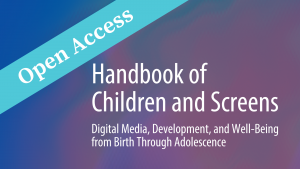-

-
 Scholarly Articles
Scholarly ArticlesDigital Media and Mental Health: Summary and Recommendations
Summary and Recommendations found in the "Handbook of Children and Screens: Digital Media, Development, and Well-Being from Birth Through Adolescence," Part One: Research Concerning Cognitive, Physical, Mental, and Psychosocial Impacts on Children, Digital Media and Mental Health Section (pages 117-172)
-
 Scholarly Articles
Scholarly ArticlesProblematic Use of the Internet: Summary and Recommendations
Summary and Recommendations found in the "Handbook of Children and Screens: Digital Media, Development, and Well-Being from Birth Through Adolescence," Part One: Research Concerning Cognitive, Physical, Mental, and Psychosocial Impacts on Children, Problematic Use of the Internet Section (pages 173-209)